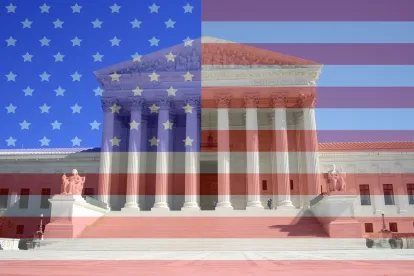Greetings, Court fans!
We're back with summaries of this week's two decisions—a truly epic employment decision and a maybe-slightly-less-than-epic Indian law decision—both authored by Justice Gorsuch.
Employers scored a big win in Epic Systems Corp. v. Lewis (No. 16-285), where the Court held that the National Labor Relations Act ("NLRA") does not trump the Federal Arbitration Act ("FAA") and thus, employment contracts can require individual arbitration of employment-related disputes.
The FAA provides that arbitration agreements are "valid, irrevocable, and enforceable" except "upon such grounds as exist at law or equity for the revocation of any contract" (the so-called "savings clause"). Here, plaintiffs argued that the relevant arbitration agreements, which required individual rather than collective or class arbitration, were illegal under the NLRA because the NLRA contemplates that employees will be permitted to pursue their rights collectively. Therefore, the plaintiffs argued, arbitration agreements that do not permit collective/class litigation should not be enforced because violation of law is a basis for revocation of a contract. This issue had divided the Courts and even the Executive Branch. The NLRB, which had itself changed positions on this issue over time, filed a brief siding with the plaintiffs, while the Solicitor General filed a separate brief, siding with the defendants.
The issue also divided the Court, which split 5-4. For the majority, the question came down to simple statutory construction. First, the argument that the arbitration agreements were illegal because they waived collective or class litigation was not an argument applicable to "any contract," but instead one that singled out arbitration agreements, which by their nature envision streamlined individualized procedures, for unfavorable treatment. Thus, the argument did not fall within the scope of the FAA's saving's clause. Justice Thomas, who joined the majority opinion in full, concurred separately to argue that the savings clause was also inapplicable because the argument being raised did not involve "revocation" of the contract because it did not go to the formation of the arbitration agreement itself, such as a claim of fraud in the inducement might.
Second, the majority found no conflict between the FAA and the NLRA. The NLRA is focused on allowing employees to bargain collectively for rights. But the NLRA says nothing about the court or arbitral mechanisms for vindicating those rights. (The Court noted that employees could use their NLRA rights to collectively bargain to insist on not having arbitration agreements, but the NLRA did not itself mandate that availability of class/collective actions.) Indeed, the NLRA was passed prior to the provisions for class and collective actions that exist today. Moreover, repeals by implication are disfavored. Absent a clear conflict, the Court must read the two statutes in harmony and enforce both.
The Court also noted that plaintiffs sought to pursue claims under the Fair Labor Standards Act ("FLSA"), which has a provision permitting employees to sue in a collective action. However, plaintiffs conspicuously did not rely on this more direct FLSA provision to support their contention, because courts had repeatedly held that while the FLSA made such mechanism available, employers and employees could still agree to bilateral arbitration instead, as they did here. Plaintiffs could not rely on vague arguments under the NLRA to avoid this result.
Finally, turning to the NLRB's position, the majority found that the Board's interpretation was both irrelevant (since there was no statutory ambiguity) and not entitled to deference (since the Board had flip-flopped in the past and was at odds with the SG). (NB. This is not the first time this term that the Court has declined to apply Chevron deference where it might have in the past and it's well known that Justice Gorsuch would vote to overturn Chevron in a heartbeat if given the chance.) While the Court acknowledged that there might be sound policy reasons to prohibit agreements that ban collective action, that issue was for the legislature, not the Court.
Justice Ginsburg led the dissent, which decried the majority's conclusion as "egregiously wrong" and called on Congress to correct "the Court's elevation of the FAA over worker's rights to act in concert." In the dissent's view, the right to collective action protected under the NLRA included the right to pursue legal rights collectively, not just bargain for them.
Next, in Upper Skagit Indian Tribe v. Lundgren (No. 17-387), the Court clarified that its decision in County of Yakima v. Confederated Tribes and Bands of Yakima Nation (1992) did not create an exception to tribal sovereign immunity for in rem suits. But the Court left open the possibility that disputes over off-reservation land fall within a related immunity exception for suits involving immovable property located within another sovereign's territory.
At issue was a quiet-title action in Washington State court brought by Sharline and Ray Lundgren, who claimed ownership of land to which the Upper Skagit Tribe also made a claim. The state courts sided with the Lundgrens, rejecting the Tribe's sovereign immunity defense on the theory that Yakima had established an exception to tribal sovereign immunity for in rem suits.
Overturning the state court decision in a 7-2 opinion, the Court held that Yakima did not address the scope of tribal sovereign immunity and instead involved only the interpretation of the Indian General Allotment Act of 1887 in relation to in rem taxes. On this, everyone agreed, including the Lundgrens. The real question was whether the Court should affirm the judgment on alternative grounds by recognizing an exception to tribal sovereign immunity in suits involving immovable property located in another sovereign's territory. The Court declined to address the question and remanded it to the Washington Supreme Court to consider in the first instance, noting that restraint was appropriate because the issue had arisen late in the briefing process.
While joining the Court's minimalist opinion, Chief Justice Roberts and Justice Kennedy quite clearly signaled in a concurring opinion that, should the issue return, they would hold that sovereign immunity does not bar people in the Lundgrens' position from asking courts to settle disputes with tribes over off-reservation property.
In dissent, Justice Thomas (joined by Justice Alito) criticized the majority for "cast[ing] uncertainty" over an issue that the Court could very easily have clarified: namely, that tribes, no less than states and foreign nations, are subject to the well-recognized exception to sovereign immunity for suits involving land in another sovereign's territory.






 />i
/>i


